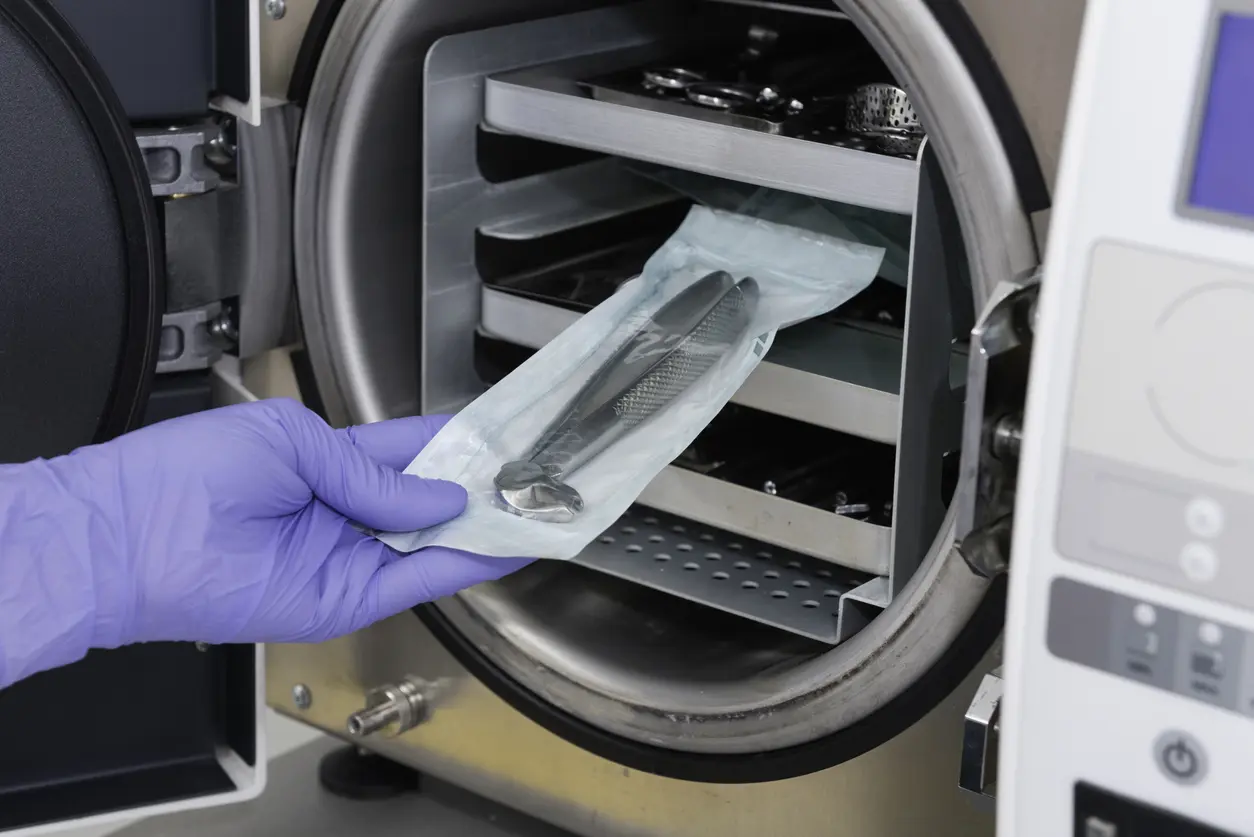Professional Development
Home / Professional Development / Healthcare / Sterile Processing Technician
Sterile Processing Technician
What does a Sterile Processing Technician do?
A sterile processing technician is a professional who prepares surgical instruments and devices. Other titles a sterile processing technician may be called include central processing technician, sterile preparation technician, central sterile supply technician, and more. They clean, inspect, test, sterilize, store, and deliver devices needed for surgery in healthcare facilities.
The main goal of a sterile processing technician is to prevent the spread of infection by ensuring that all instruments are disease-free. Other job duties may include, verifying and accurately documenting missing instruments, recording sterilizer test results, ensuring each instrument is in good working order prior to use, operating and maintaining steam autoclaves, and effectively communicating with operating room personnel and others.
Where Can You Work?
Sterile processing technicians work in hospitals, surgery centers, clinics, outpatient care centers, ambulatory services centers, dentists’ offices, and other healthcare facilities.
Length
14 Weeks
Requirements
- High School Diploma or GED
- Web browser with internet connection
- Course registration & payment
Training Materials Provided
- Expert-led video based training
- Textbook: Central Service Technician Manual
- Competency assessments
- National Certification exam fee
Cost
$4,000
Clinical Requirement
A clinical component is required for this program. We will assist students enrolled in this program find a clinical location. If you have any questions about the clinical requirements of this program, please discuss them with your Training Specialist.
Sterile Processing Technician
Healthcare employment is projected to grow by 13% from 2021 to 2031, according to the Bureau of Labor Statistics. This means that over the next decade there will be nearly 2 million new positions available for those interested in healthcare.
Upon completion of this training, you’ll be able to:
- Knowing medical terminology, disease processes, anatomy and physiology
- The importance of customer service, communication skills, and professionalism
- Identifying central service workflows processes from cleaning, decontamination, preparation and packaging to sterilization and storage of surgical instruments and equipment
- Describing the importance of manufacturer’s instructions for use (IFU), infection control and use of personal protective equipment (PPE) throughout central service areas and their impact on personnel and patient safety
- Differentiating methods for quality control and assurance and the necessity of central service process documentation
- Discussing compliance standards and the role of HIPAA, OSHA, CDC, FDA, ANSI, AAMI and other regulating agencies
Courses - 14 Weeks
- Professionalism in Allied Health
- Introduction to Human Anatomy and Medical Terminology
- Sterile Processing
Program Preview
Sterile Processing Technician Job Possibilities

Sterile Processing Technician

Central Service Technician

Central Sterile Supply Technician
Certification Information
Upon completion of this program, you’ll be eligible to take the provisional certification exam for Certified Registered Central Service Technician (CRCST) sponsored by the Healthcare Sterile Processing Association (HSPA).
Certified Registered Central Service Technician
Full certification is obtained after acquiring 400 hours of hands-on sterile processing experience within six months of provisional certification. Hands-on experience provides an invaluable resource with which to better understand the standards, knowledge and practices needed to be successful in the field and on the CRCST exam.
PLEASE NOTE: Students residing in the states of New York, New Jersey, Connecticut, Tennessee and Pennsylvania – these states require that Central Service Technicians become certified within a state-mandated period of time after employment (range from 1.5 – 3 years). This is NOT a barrier to enrollment for students but should be reviewed with your Training Specialist at time of enrollment.
Issuing Authority

Payment Options
Pay in full using any major credit card, PayPal, or Venmo. Select “credit card” as your payment option.
![]()


Apply for PayPal Credit and pay zero interest if your balance is paid in full within 6-months. Complete a quick application and you’ll receive a credit decision within seconds.


Program Comparison
|
|
Emerge Education
|
Community College
|
|---|---|---|
|
Program & Tuition Cost
|
$4,000 average
|
Up to $20,000
|
|
Exam Fees, Books & Materials
|
Included
|
Up to $750
|
|
Job Ready In
|
3–6 months
|
24–48 months
|
|
Schedule Flexibility
|
On-demand 24/7
|
Set class schedule
|
|
Travel Requirements
|
None: 100% online
|
On-campus classrooms
|
|
Student Support
|
Personal Advisors: text, call and email access
|
Professors: scheduled office hours
|
|
Career Coaching
|
Exam-tailor + soft-skill training to build well-rounded careers
|
Exam-based + prerequisites and electives to meet credit
|
|
Content Delivery
|
3D animations, immersive environments, interactive activities, game-based learning
|
Professor lectures
|
Meet Your Training Specialist
Michelle Meiser is your Training Specialist. She is here to help you understand the program, payment options and succeed! Get in touch with Michelle to learn more about the program and how to achieve your career goals. If you are a manager interested in group enrollment, please contact Michelle directly so she can assist you with the enrollment process.
FAQ
Sterile processing is important because it prevents infections in health care settings. Handwashing, sterilization and disinfection of tools, instruments and equipment are necessary for the safety of the patient.
Sterilization technician positions can offer flexible working hours (from weekdays to nights and weekends). The exact shift requirements vary based on the type of facility. A hospital will most likely have evening and overnight shifts available. Since there are so many places to find work, you should be able to find the schedule that is the best fit for you.
The time it takes to become a sterile processing technician is relatively short for a career in health care. You can earn a good salary, often with excellent benefits, without going into much educational debt. The medical field is growing very rapidly, so jobs will continue to be in demand.
Most sterile processing technicians have a fair amount of autonomy, so you’ll need to be good at keeping yourself on track while completing tasks. Attention to detail is also critical for this career, as sterile processing technicians must adhere to strict infection-control procedures to prevent potentially life-threatening consequences. Finally, you’ll need sufficient manual dexterity to handle sharp instruments and operate sterilization equipment, and the interpersonal skills to work well with others in an occasionally fast-paced environment.
Sterile processing technicians are responsible for sterilizing and disinfecting all equipment as well as packaging tools used for medical procedures. The surgical technologist assists surgical teams while ensuring patient safety before, during and after surgery. They’re also responsible for preparing the operating room and the patient before and after surgery.